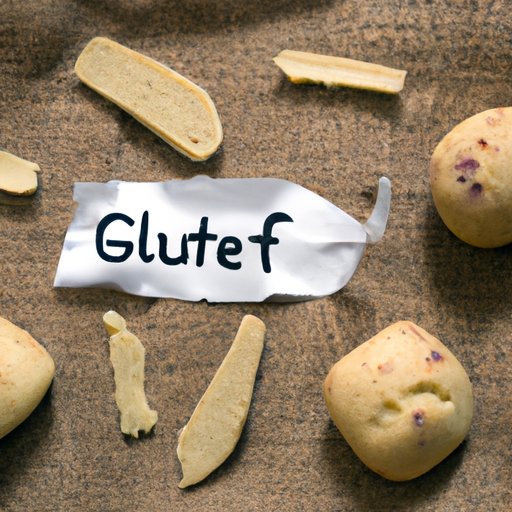
Introduction
A gluten-free diet is a necessity for those with celiac disease, non-celiac gluten sensitivity or wheat allergy. Eating gluten-free involves avoiding foods with gluten, a protein found in wheat, barley, and rye. The popularity of gluten-free diets has led many people to wonder if potatoes, a staple food in many cuisines, are gluten-free.
The truth is, potatoes are a great choice for those following a gluten-free diet. They are versatile, nutritious, and inexpensive, making them a go-to food to incorporate in gluten-free meals. In this article, we will explore the gluten-free status of potatoes and take a closer look at how potatoes fit into a gluten-free lifestyle.
Gluten-Free Options: The Truth About Potatoes
Potatoes are naturally gluten-free. They do not contain gluten and are safe for people on a gluten-free diet. However, there are some processing methods that may cause cross-contamination, leading to the presence of gluten in potato products.
For example, some potato chips and French fries may not be gluten-free because of how they are processed. They may be dusted with flour or come into contact with other gluten-containing foods during manufacturing. Therefore, it is important to read labels carefully and choose products certified as gluten-free.
Dietary Restrictions: Can You Eat Potatoes on a Gluten-Free Diet?
Gluten can cause damage to the lining of the small intestine in people with celiac disease, making it difficult to absorb nutrients from food. It can also trigger digestive symptoms and non-celiac gluten sensitivity. Therefore, adopting a gluten-free diet is crucial for people with gluten-related disorders.
Aside from medical reasons, some people choose to follow a gluten-free diet because of perceived health benefits. While studies on this are limited, some people report improvements in digestive symptoms, energy levels, and skin health after adopting a gluten-free diet.
Potatoes are an excellent addition to a balanced gluten-free diet. They are a rich source of vitamins, minerals, and dietary fiber. They can be used in a variety of gluten-free recipes to add texture and flavor to dishes.
A Comprehensive Guide to Potatoes and Gluten-Free Lifestyles
Potatoes are nutrient-dense vegetables that are low in calories but high in fiber, vitamin C, and potassium. They come in various types, each with a distinct flavor and texture. Some of the most popular types of potatoes include:
- Russet potatoes
- Red potatoes
- Yellow potatoes
- Purple potatoes
As mentioned earlier, all types of potatoes are gluten-free. However, it is crucial to be aware of other ingredients included in a potato dish as they may contain gluten.
When cooking with potatoes, opt for naturally gluten-free ingredients like olive oil, herbs, and spices. Avoid using pre-made sauces or seasonings that may contain gluten.
Here are some gluten-free potato recipe ideas to try:
- Mashed potatoes
- Potato salad
- Baked potatoes
- Roasted potatoes
- French fries (made from fresh potatoes)
Breaking Down the Gluten-Free Status of Potatoes
When shopping for potatoes, it is essential to read labels and look for certified gluten-free products. The term ‘gluten-free’ on a label means that the product contains less than 20 parts per million (ppm) of gluten. Products with the gluten-free certification from recognized organizations are guaranteed to be safe for consumption by people with gluten-related disorders.
Research studies on the gluten-free status of potatoes have confirmed that they are safe to consume for people on a gluten-free diet. One study tested 60 samples of potato, including chips, French fries, and frozen hash browns, and found that none of them contained gluten.
However, some unprocessed potatoes may become contaminated during transportation or storage. Therefore, it is important to wash potatoes before using them and store them in a clean, dry place away from other gluten-containing foods.
Clearing Up the Potato-Gluten Confusion: An Expert’s Take
According to Dr. Alessio Fasano, an expert in gluten-related disorders, potatoes are naturally gluten-free and safe for people on a gluten-free diet. He explains that gluten is not added to potatoes, nor is it produced during the growth or processing of potatoes.
However, he also notes that cross-contamination can occur during manufacturing, transportation, or preparation of potato products. Therefore, it is crucial to read labels and look for certified gluten-free products.
Potatoes in a Gluten-Free Diet: A Complete Overview
In summary, potatoes are a great choice for people on a gluten-free diet. Not only are they naturally gluten-free, but they are also rich in nutrients and versatile in cooking methods.
When incorporating potatoes into a gluten-free diet, be mindful of other ingredients added to potato dishes that may contain gluten. Choose certified gluten-free potato products and always check labels for gluten-containing ingredients.
For those who are new to a gluten-free lifestyle, there are many resources available to help. Websites and publications such as the Gluten-Free Living magazine provide tips and recipes for gluten-free living.
Conclusion
In conclusion, potatoes are a delicious and versatile gluten-free food. They are an excellent addition to a balanced gluten-free diet, providing essential nutrients and fiber.
When shopping for potatoes, make sure to choose certified gluten-free products and be mindful of other ingredients added to potato dishes. By following these guidelines, people on a gluten-free diet can confidently include potatoes in their meals and reap their nutritional benefits.





